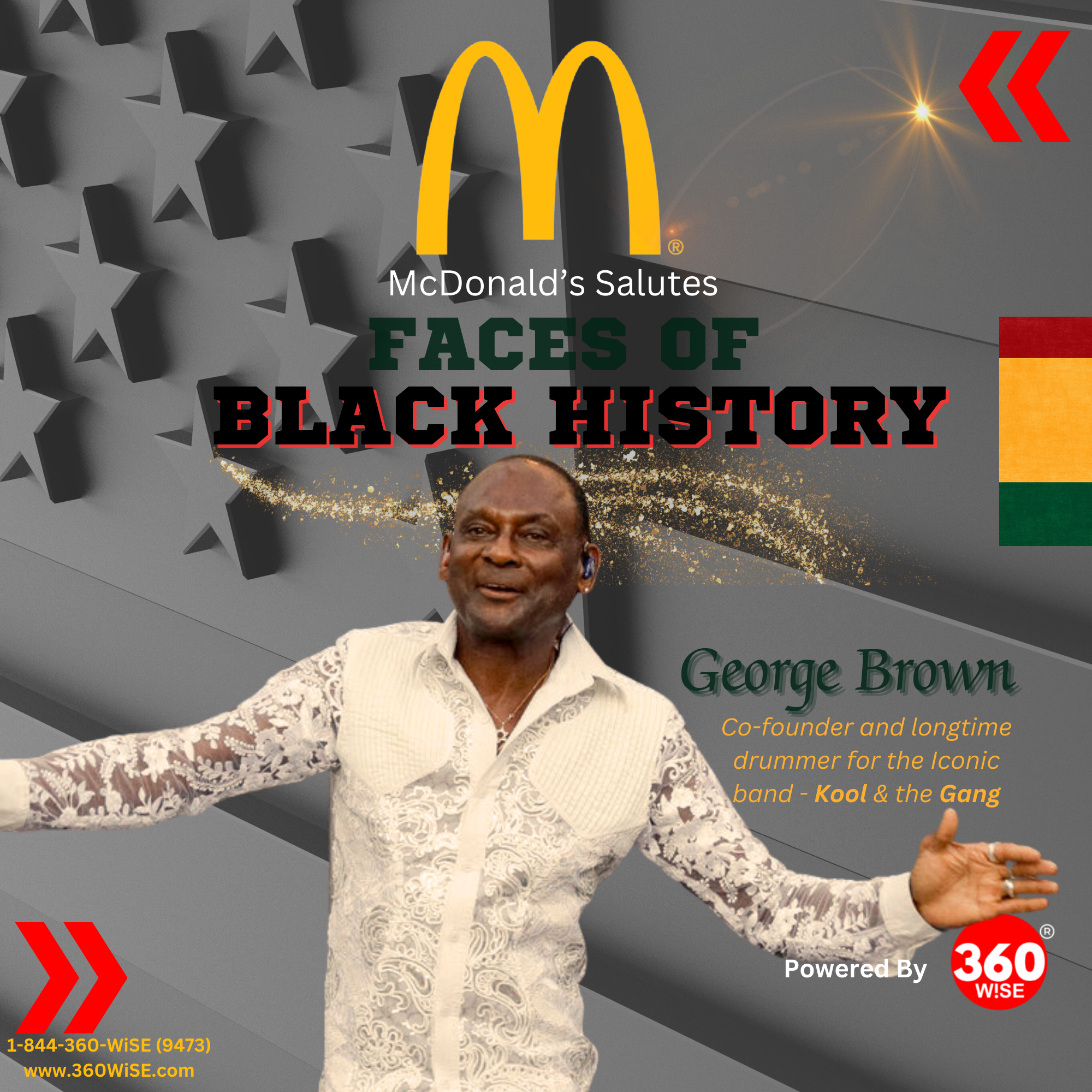 Salutes Faces of Black History Back To McDonald's Salutes Faces of Black History 2025
Salutes Faces of Black History Back To McDonald's Salutes Faces of Black History 2025
Colin Powell

First African-American Secretary of State in U.S. history.
Colin Powell broke new ground as the first African-American Secretary of State in U.S. history. His remarkable life began in Harlem, New York on April 5, 1937. Powell’s rise to become one of America’s most influential military and diplomatic leaders showcases an extraordinary path. He served two tours in Vietnam during his distinguished military career. The military recognized his exceptional leadership abilities, and Powell became the youngest Chairman of the Joint Chiefs of Staff at age 52. His role as the 65th Secretary of State from 2001 to 2005 proved pivotal in shaping American foreign policy. Powell guided critical initiatives, including America’s response to the September 11, 2001 terrorist attacks. His outstanding service to the nation earned him both the Congressional Gold Medal and Presidential Medal of Freedom. These honors solidified Powell’s legacy as a transformative figure in American leadership.
Early Life and Military Beginnings
Colin Powell was born to Luther and Maud Powell in Harlem, New York. His parents were determined Jamaican immigrants who came to America during the 1920s. Both parents had mixed African and Scottish ancestry and made their home in the South Bronx. Luther worked as a shipping clerk while Maud earned a living as a seamstress.
Jamaican Immigrant Family Background
Education and personal achievement were the life-blood of success in the Powell household. Their steadfast dedication and encouragement shaped their son’s future military career significantly. The family’s strong work ethic and values built an excellent foundation despite their modest beginnings.
Education and ROTC Leadership
Powell studied geology at the City College of New York. His life changed after he joined the Reserve Officers’ Training Corps (ROTC). ROTC helped him find his true calling, and he achieved remarkable success:
Company commander of the Pershing Rifles
Cadet colonel – the highest rank in the corps
Distinguished military graduate
Early Military Service in Vietnam
Powell received his commission as a second lieutenant after graduating in 1958. He began his military career and served his first Vietnam tour in 1962 as one of 16,000 advisers sent by President Kennedy. A punji-stick booby trap injured him while he patrolled the Vietnamese-Laotian border, earning him the Purple Heart. His second tour in 1968 showed exceptional courage. He rescued three fellow soldiers, including division commander Major General Charles M. Gettys, from a burning helicopter crash. This brave act earned him the Soldier’s Medal.
Rising Through Military Ranks
Powell’s military career moved faster after his Vietnam service. His exceptional leadership abilities led to his most important command responsibilities when he became battalion commander in Korea in 1973. He took brigade command in the elite 101st Airborne Division by 1976.
Key Command Positions
Powell became the youngest general officer in the Army at age 42. He led 75,000 soldiers as commander of V Corps in Frankfurt, Germany in 1986, during the Cold War’s final years. His leadership style combined decisive action with strategic planning.
Strategic Defense Roles
The military recognized Powell’s expertise in strategy and named him senior military assistant to Defense Secretary Caspar Weinberger. He served as deputy to Frank Carlucci at the National Security Council. His work in arms negotiations with Soviet leader Mikhail Gorbachev helped shape military policy.
Becoming Four-Star General
Powell earned his four-star general rank in April 1989. This achievement led to his historic role as Chairman of the Joint Chiefs of Staff, making him the youngest officer in this position. He arranged major changes in national military strategy that moved focus from Soviet containment to regional and humanitarian crises. The military went through a 25 percent reduction while he retained control of United States’ superpower status through his “base force” concept.
The Powell Doctrine, which supports overwhelming force in military operations, emerged from his strategic approach. This philosophy led to a soaring win in both the 1989 Panama invasion and the 1991 Persian Gulf War. His leadership during these operations earned him both the Congressional Gold Medal and the Presidential Medal of Freedom.
Historic Leadership Positions
Colin Powell achieved a historic milestone in October 1989. He became the 12th Chairman of the Joint Chiefs of Staff, the highest military position in the Department of Defense.
First Black Chairman of Joint Chiefs
Powell broke new ground at age 52. He became both the youngest officer and first African-Caribbean American to serve in this position. His appointment stood out as the first Joint Chiefs chairman commissioned through ROTC. The original military operations he oversaw came during an era of faster global change. Powell directed the most substantial transformation in national military strategy since the 1940s.
Operation Desert Storm Command
Powell’s leadership included responses to 28 critical situations. He arranged two major military operations: the 1989 invasion of Panama to remove General Manuel Noriega and Operation Desert Storm in 1991. Desert Storm succeeded through these strategic objectives:
- Deployment of 500,000 American and allied troops
- Implementation of overwhelming force doctrine
- Precise execution of the “cut off and kill” strategy
Transforming Military Strategy
The Powell Doctrine, his lasting contribution to military strategy, emphasized:
- Clear political objectives
- Decisive force deployment
- Strong public support
Powell supported exhausting all diplomatic, economic, and political means before military action. His strategic approach led to soaring wins in both Panama and Kuwait operations, earning widespread recognition. His leadership during these conflicts earned him the Congressional Gold Medal and Presidential Medal of Freedom.
Diplomatic Career and Legacy
President George W. Bush nominated Colin Powell as Secretary of State in December 2000. The U.S. Senate unanimously confirmed his nomination. Powell took office in January 2001 and became the first African American to serve as the nation’s top diplomat.
First Black Secretary of State
Powell focused on building stronger diplomatic alliances worldwide and preferred sanctions over military force. The September 11, 2001 terrorist attacks defined his term, and he supported swift action against al-Qaeda.
Major Foreign Policy Challenges
Powell’s State Department achieved several significant milestones:
- Doubled development assistance funding for international AIDS prevention
- Secured the Moscow Treaty on Strategic Offensive Reductions in 2002
- Managed diplomatic crises in India-Pakistan relations and Liberia
- Supported the 2002 “Road Map” peace plan between Israel and Palestine
Powell’s most challenging period came during the Iraq War. His February 2003 United Nations presentation supported military action based on intelligence about weapons of mass destruction. This decision later proved problematic. Powell’s integrity remained intact as he openly acknowledged this misstep, showing his dedication to accountability.
Post-Government Impact
Powell announced his resignation in November 2004 and returned to public service through America’s Promise Alliance. He spent his post-government years supporting youth development and democratic values. His legacy includes both remarkable achievements and honest acknowledgment of mistakes. This earned him respect across political lines.
Conclusion
Colin Powell’s remarkable story shows what’s possible in America. The son of Jamaican immigrants from Harlem rose to become one of the nation’s most respected leaders. His groundbreaking work altered military strategy through the Powell Doctrine. He showed excellence at the highest levels as Chairman of the Joint Chiefs of Staff.
Powell broke new ground as the first African American Secretary of State. His time in office faced major challenges after September 11, 2001. The Iraq War period brought difficulties, but his readiness to admit mistakes strengthened his reputation for honesty and integrity.
Powell’s influence reaches far beyond his government roles. He stayed dedicated to developing youth and promoting democratic values after leaving office. His story inspires new generations today. This makes sharing the 360Wise McDonald’s Salutes Faces of Black History Time capsule with family and friends meaningful.
Clear objectives, decisive action, and steadfast dedication to public service define Powell’s lasting legacy. His life proves how determination and strong values can break barriers and change history. Colin Powell helped create a stronger, more inclusive America through his military service, diplomatic leadership, and personal example. He earned respect from all political sides.

QUICK FACTS

Thank you to the New York Tristate Owner and Operators Association for your continued support.
























